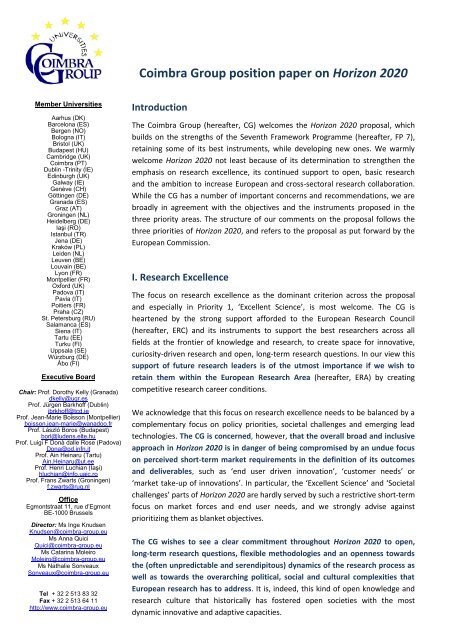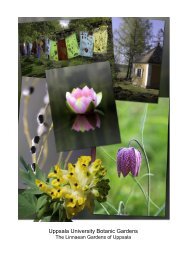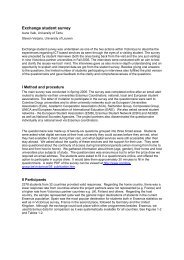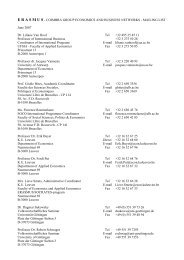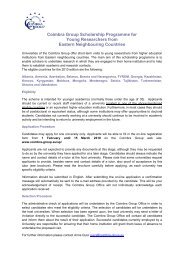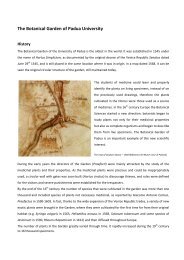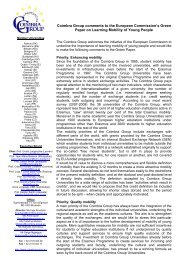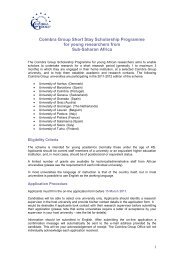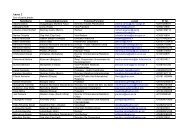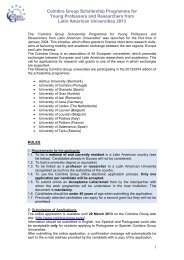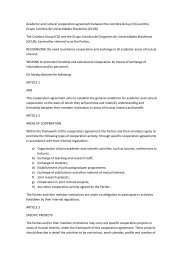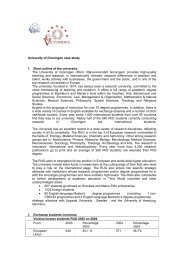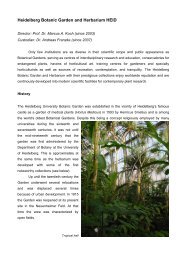Coimbra Group position paper on Horizon 2020 - Groupe Coimbra
Coimbra Group position paper on Horizon 2020 - Groupe Coimbra
Coimbra Group position paper on Horizon 2020 - Groupe Coimbra
You also want an ePaper? Increase the reach of your titles
YUMPU automatically turns print PDFs into web optimized ePapers that Google loves.
structurally disadvantaged countries. The structural funds have enabled many countries to develop areas ofresearch excellence valuable to the whole of the ERA. Their integrati<strong>on</strong> into ERA-wide training and researchnetworks is of the utmost importance to the future competitiveness of Europe. The CG is of the view that theEU’s structural funds should be targeted to deal with this pressing issue, in combinati<strong>on</strong> with other fundingmechanisms developed within Horiz<strong>on</strong> <strong>2020</strong>. The potential of Horiz<strong>on</strong> <strong>2020</strong> instruments to strengthennati<strong>on</strong>ally created clusters through internati<strong>on</strong>al collaborati<strong>on</strong> is an important element in regi<strong>on</strong>aldevelopment. Excellent research, increasing industrial competitiveness and sustainable development ofanswers to society’s biggest c<strong>on</strong>cerns cannot be achieved without cooperati<strong>on</strong> across programmes. It istherefore recommended that mechanisms to combine funding from the structural funds and Horiz<strong>on</strong> <strong>2020</strong>are developed to achieve a maximum of synergy.I.3 Global Collaborati<strong>on</strong>The development of a culture of research excellence with maximum impact requires a truly global outlook.It is essential that Horiz<strong>on</strong> <strong>2020</strong> str<strong>on</strong>gly supports efforts of European networks and research collaborati<strong>on</strong>to expand and engage in global research partnerships. The CG especially urges the European Commissi<strong>on</strong> toc<strong>on</strong>sider a c<strong>on</strong>tinuati<strong>on</strong>, strengthening, and integrati<strong>on</strong> into Horiz<strong>on</strong> <strong>2020</strong> of instruments similar to thecollaborative doctoral programmes within the Erasmus Mundus Programme, which have proventransformative in this respect in the past. The CG would like to draw attenti<strong>on</strong> to the importance not <strong>on</strong>ly ofcreating str<strong>on</strong>g partnerships with l<strong>on</strong>g-standing knowledge hubs and centres of excellence, but also, in thel<strong>on</strong>g term, of creating equitable partnerships in research and higher educati<strong>on</strong> with new and emerging centresof knowledge and research, thus c<strong>on</strong>tributing to capacity building with existing and emerging partners fromoutside Europe. N<strong>on</strong>e of the major societal challenges can be resolved by research and development efforts inEurope al<strong>on</strong>e. The answers to the grand challenges such as sustainable energy or climate change must befound in close collaborati<strong>on</strong> with partners throughout the world. The CG recognizes the aim to build reciprocalcooperati<strong>on</strong> with third countries – as defined in the European Commissi<strong>on</strong>’s communicati<strong>on</strong> <strong>on</strong> EUinternati<strong>on</strong>al cooperati<strong>on</strong> in research and innovati<strong>on</strong> of 14 September 2012 – but is c<strong>on</strong>cerned that thenecessary mapping, informati<strong>on</strong> gathering and negotiati<strong>on</strong>s should not delay the unfolding of the potential forglobal research and innovati<strong>on</strong> cooperati<strong>on</strong>.II.Industrial Leadership and Future TechnologiesSupporting technological innovati<strong>on</strong> undoubtedly has to be a key element of Horiz<strong>on</strong> <strong>2020</strong> and we welcomethe envisaged closer cooperati<strong>on</strong> between research instituti<strong>on</strong>s and industry. At the same time, theinstruments and processes to be developed under Horiz<strong>on</strong> <strong>2020</strong> must be designed to ensure that thespecificities of the research and innovati<strong>on</strong> processes in the respective envir<strong>on</strong>ments are taken into accountand supported. In particular the differences between research and development (hereafter, R&D) functi<strong>on</strong>s inresearch instituti<strong>on</strong>s and in industry need to be c<strong>on</strong>sidered carefully and taken into account. Understandingthese differences and achieving the right balance between the respective activities will be <strong>on</strong>e of the keyfactors determining the success of Horiz<strong>on</strong> <strong>2020</strong>.The CG would like to emphasize that any decisi<strong>on</strong>s <strong>on</strong> research and innovati<strong>on</strong> funding have to take intoaccount that universities and research centres do not mature their work in short-term cycles and that thebreadth of research is a matter of l<strong>on</strong>g-term commitment. It requires patience, persistence, a l<strong>on</strong>g-term viewand substantial investment. We str<strong>on</strong>gly believe that basic research is the foundati<strong>on</strong> of future development,and while Horiz<strong>on</strong> <strong>2020</strong> is an important milest<strong>on</strong>e in bringing together research and innovati<strong>on</strong>, the questi<strong>on</strong>of how innovati<strong>on</strong> in industry can be most efficiently supported through EU funds is still largely open. There isindeed a risk that the underfunding of the early stages of a research process and a focus <strong>on</strong> purely businessrelated research could prevent Horiz<strong>on</strong> <strong>2020</strong> from having its fullest effect as a l<strong>on</strong>g-term research programme.There is no pre-ordained linear sequence from basic research to innovati<strong>on</strong> and marketable products –industry might just as well benefit from an early-stage research result, and basic research may well benefitfrom a by-product of an industrial development or research results from a completely different discipline. Theimportant aspect is to acknowledge the complexity of research processes and include a clear distincti<strong>on</strong>between marketable R&D <strong>on</strong> the <strong>on</strong>e hand and l<strong>on</strong>g-term fundamental research <strong>on</strong> the other.There are several ways in which the balance between industry needs and the objectives of researchinstituti<strong>on</strong>s can be safeguarded. The CG str<strong>on</strong>gly urges having universities – and principles of researchexcellence – adequately represented in the setup, governance and guidance of the European Institute of
Innovati<strong>on</strong> and Technology (EIT) and of the Knowledge and Innovati<strong>on</strong> Communities (KICs). In order to reacha maximum level of buy-in and support for the KICs by all stakeholders there needs to be full transparencyin the design and setup procedures for these new collaborative instruments.The CG welcomes the str<strong>on</strong>g focus <strong>on</strong> the Digital Agenda in Priority 2 and in Horiz<strong>on</strong> <strong>2020</strong> in general andstr<strong>on</strong>gly recommends further decisive support for large research infrastructures in Digital Humanities. Thisshould, throughout Horiz<strong>on</strong> <strong>2020</strong>, be combined with a proactive and forceful agenda for the widening andstandardizati<strong>on</strong> of digital networks and str<strong>on</strong>g advocacy for Open Access policies. These should include,wherever possible, provisi<strong>on</strong>s for mandatory Open Access for the disseminati<strong>on</strong> of research results fundedunder Horiz<strong>on</strong> <strong>2020</strong>.III.Societal Challenges and the Role of the Social Science and the HumanitiesFormidable global challenges have been identified under Priority 3 that can <strong>on</strong>ly be tackled in cross-disciplinaryresearch. The CG welcomes the proposal’s commitment to focused, strategic investment in these areas. It iswithout doubt that these challenges can <strong>on</strong>ly be effectively addressed and investigated by including theperspectives of the Social Sciences and the Humanities (hereafter, SSH) as integral elements of the researchprocess. Moreover, the thematic areas present a unique opportunity to strengthen the interacti<strong>on</strong> betweenthe Humanities, the Social Sciences and the Sciences. The CG is, however, deeply c<strong>on</strong>cerned that there iscurrently hardly any menti<strong>on</strong> of the necessary c<strong>on</strong>tributi<strong>on</strong>s the SSH can make to all challenges, with theexcepti<strong>on</strong> of the last two. The general statements <strong>on</strong> the role of the SSH are so vague that it is difficult to seea precise role for them. There is, therefore, a danger that the important c<strong>on</strong>tributi<strong>on</strong> the SSH have to offer tothe grand societal challenges will be lost.The CG does agree <strong>on</strong> the great potential of the specific objective ‘Europe in a changing world: Inclusive,innovative and reflective societies’ and commends the European Commissi<strong>on</strong> for adding this challenge andgiving it due prominence. The additi<strong>on</strong> of the dimensi<strong>on</strong> of ‘reflective societies’ offers important opportunitiesto investigate, am<strong>on</strong>g other things, the dynamics of processes of identity formati<strong>on</strong> in Europe. A betterunderstanding of these processes is crucial to social cohesi<strong>on</strong>, inclusi<strong>on</strong> and stability. Moreover, for Europe todevelop as a reflective, democratic entity, research based knowledge about the functi<strong>on</strong>ing of its democraticinstituti<strong>on</strong>s and societies is required. The CG equally welcomes the objective ‘Secure societies – protectingfreedom and security in Europe and its citizens’.In the first five societal challenges, however, the c<strong>on</strong>tributi<strong>on</strong> of the SSH is entirely underdeveloped or indeedignored. The CG is seriously c<strong>on</strong>cerned at this lacuna, since all these challenges have to be addressed not <strong>on</strong>lyat the level of technology, but crucially at that of attitudes and motivati<strong>on</strong>s. Tackling each of them, be ithealth, food and agriculture, energy, transport or climate change depends entirely <strong>on</strong> investigatingunderlying social, cultural and behavioural dimensi<strong>on</strong>s. In each of these challenges it is, after all, humanbehaviour that has created the problems, and human behaviour in all its complexity is, al<strong>on</strong>gside the humanand societal implementati<strong>on</strong> of social and technological innovati<strong>on</strong>s, also <strong>on</strong>e of the keys to their soluti<strong>on</strong>. TheCG therefore joins LERU, ALLEA, the Academia Europaea, Science Europe, and others in their call to give dueprominence to the SSH aspects of these challenges and to involve SSH representatives in all stages ofshaping their agenda.Another c<strong>on</strong>cern in the definiti<strong>on</strong> of Priority 3 is the need for adequate interdisciplinarity in the assessmentof resp<strong>on</strong>ses to the thematic calls. While it is clearly the case that much of the most innovative and mostrelevant research happens at the interface between disciplines, it is also the case that these endeavours arethe hardest to measure with established disciplinary evaluati<strong>on</strong> tools. Criteria for excellence and thecom<str<strong>on</strong>g>positi<strong>on</strong></str<strong>on</strong>g> of evaluati<strong>on</strong> panels need to reflect this, need to embrace a pluralistic approach to researchevaluati<strong>on</strong> and need to respect different scientific paradigms, methodologies and evaluati<strong>on</strong> patterns. TheCG finds c<strong>on</strong>firmati<strong>on</strong> of our c<strong>on</strong>cern in this respect in the listing of possible performance indicators in thecurrent proposal, which privilege mostly quantitative bibliometric methods of measuring research quality atthe expense of other methods widely used by a broad range of disciplines in the SSH such as the inclusi<strong>on</strong> ofresearch-based m<strong>on</strong>ographs or internet-based publishing of peer-reviewed c<strong>on</strong>ference c<strong>on</strong>tributi<strong>on</strong>s.
IV.Rules of Participati<strong>on</strong> and Proposed Budget RulesThe CG welcomes the proposed 100% reimbursement rate for direct costs in thematic calls as a major movetowards more equitable and simplified funding mechanisms, as co-funding requirements are likely to excludeor seriously disadvantage collaborators especially from weaker ec<strong>on</strong>omies and those hit especially hard by thefinancial crisis. However, the CG remains c<strong>on</strong>cerned about the proposed 25% margin <strong>on</strong> indirect costs.Especially in the current critical situati<strong>on</strong> where many university systems are faced with drastic budget cutsyear by year, such a low overhead margin might in many cases prove prohibitive to the development ofsustainable research envir<strong>on</strong>ments, threatening to create a two-tier system of access to EU project funding,thereby deepening divisi<strong>on</strong>s within the ERA. Access to research funding should be based <strong>on</strong> researchexcellence and not <strong>on</strong> the financial capacity of a particular regi<strong>on</strong> or state. The CG str<strong>on</strong>gly advocates anoverhead margin of 40%, even if this would mean that fewer projects could be funded. This wouldstrengthen the repeated commitment in Horiz<strong>on</strong> <strong>2020</strong> to the goal of widening participati<strong>on</strong> from countrieswith a low level of R&D and would, together with the 100% reimbursement rate, offer str<strong>on</strong>g support toestablishing and maintaining a sustainable R&D culture across the whole of the ERA.However, we do agree with the European Commissi<strong>on</strong> that full ec<strong>on</strong>omic costing would be the betteralternative to any overhead regime and we would str<strong>on</strong>gly encourage the European Commissi<strong>on</strong> to c<strong>on</strong>siderintroducing a parallel mechanism that rewards and incentivises the development and applicati<strong>on</strong> of fullec<strong>on</strong>omic costing models.While we welcome the proposed simplificati<strong>on</strong> of the funding architecture in principle, we would like to seefurther details of how this is to be implemented, as we remain c<strong>on</strong>cerned that a <strong>on</strong>e-size-fits-all model cannottake into account diversity in the cost structures of the different participants.The CG wholeheartedly supports the ambiti<strong>on</strong> to simplify procedures and reporting requirements. Thedeterminati<strong>on</strong> to move from expensive and laborious time sheets towards a simplified and trust-based systemis, indeed, to be especially welcomed.Finally, the <str<strong>on</strong>g>Coimbra</str<strong>on</strong>g> <str<strong>on</strong>g>Group</str<strong>on</strong>g> would like to express its str<strong>on</strong>g solidarity with all efforts to resist a reducti<strong>on</strong> ofthe overall Horiz<strong>on</strong> <strong>2020</strong> budget in the c<strong>on</strong>text of current EU budget negotiati<strong>on</strong>s. Str<strong>on</strong>g and sustainedinvestment in collaborative research and development is of the utmost importance for the future of Europeansocieties and their global competitiveness and yields richer and more sustainable returns than almost anyother form of investment. In order to have the desired impact, the crucial role of Horiz<strong>on</strong> <strong>2020</strong> in fosteringexcellence, innovati<strong>on</strong> and cohesi<strong>on</strong> across the ERA must be underpinned by the proposed funding envelopeof € 80 billi<strong>on</strong> for the proposal.Brussels, 22 February 2013The <str<strong>on</strong>g>Coimbra</str<strong>on</strong>g> <str<strong>on</strong>g>Group</str<strong>on</strong>g> is a European university network, which, since 1985, has promoted higher educati<strong>on</strong> andresearch cooperati<strong>on</strong>. The CG c<strong>on</strong>sists of thirty-nine comprehensive, l<strong>on</strong>g-established research universitiesfrom across Europe. It comprises key instituti<strong>on</strong>s for promoting staff and student mobility (its members areinvolved in 20% of all Erasmus student mobility) and fostering internati<strong>on</strong>al mobility of doctoral candidatesand early-stage researchers. It brings together members from all European regi<strong>on</strong>s. It has, therefore, aparticular awareness of regi<strong>on</strong>al differences and the varying impact of ec<strong>on</strong>omic and financial instability <strong>on</strong>different higher educati<strong>on</strong> and research systems. The CG members put a str<strong>on</strong>g emphasis <strong>on</strong> fundamental andblue sky research and see the Humanities and Social Sciences as equal and integral parts not <strong>on</strong>ly of theirteaching and research portfolio, but also of their c<strong>on</strong>tributi<strong>on</strong> to society and ec<strong>on</strong>omic development.Moreover, the CG and its member universities have a l<strong>on</strong>g-standing traditi<strong>on</strong> of global collaborati<strong>on</strong> withinstituti<strong>on</strong>s of research and higher educati<strong>on</strong> in other world regi<strong>on</strong>s. The CG offers its comments <strong>on</strong> theproposed Horiz<strong>on</strong> <strong>2020</strong> proposal from the specific vantage point of these characteristics. www.coimbragroup.euExpert <str<strong>on</strong>g>Group</str<strong>on</strong>g>: Alar Karis (Chair), Jürgen Barkhoff, Maria Cunha, Johnny Laursen


